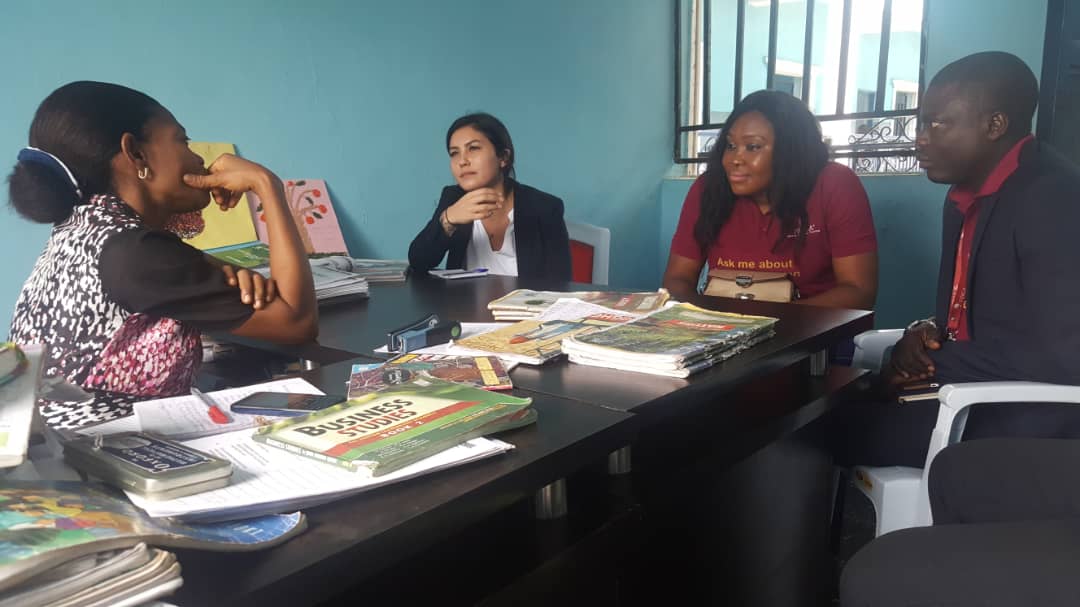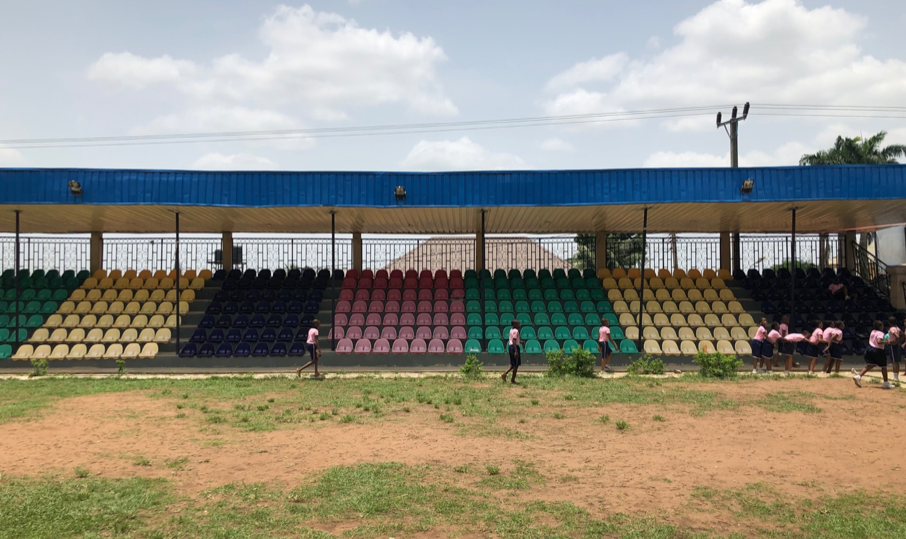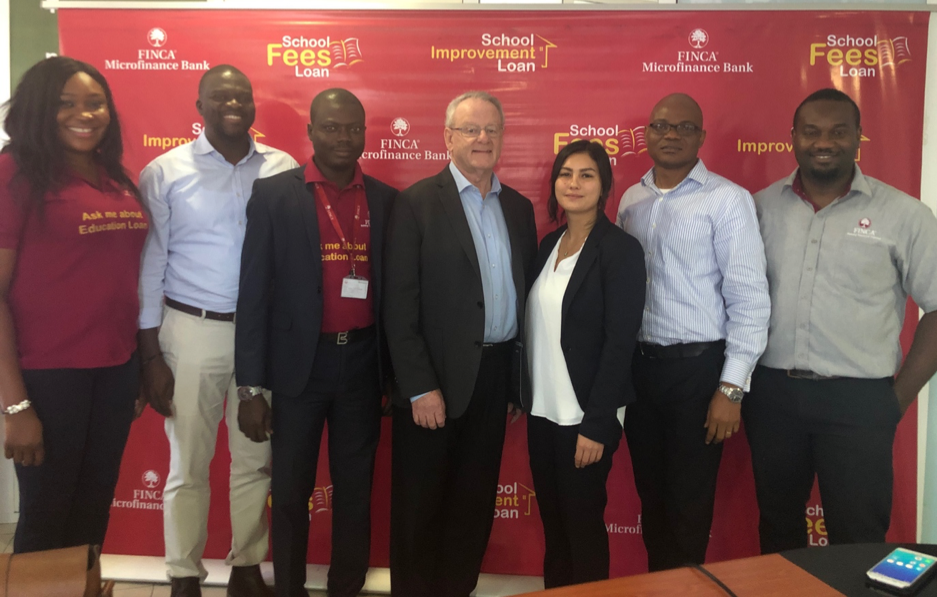Expanding Access to Education in Nigeria
I sat in Mrs Nna’s office, the principal of Christian International School in Owerri, the capital city of Imo State in Nigeria. The office was small and painted bright blue. Children’s toys and books were scattered over the desk in front of me and, to the left of the principal, paintings drawn by students were propped up against the wall. The room was hot and humid, typical of the tropical climate in Owerri. Outside I could hear murmurs coming from teachers and children in classrooms with doors and windows wide open to mitigate the heat.
Mrs Nna was explaining to me that the school had started in 2009 as a nursery school with only a handful of teachers. Thanks to a School Improvement Loan from our financial institution partner, FINCA, the primary school has expanded and now has over 400 students. Last year, the school leased a second building for a secondary school due to demand from parents. Today, the school employs 120 staff, made up of teachers and assistants, who may enrol their children in the school for free as a benefit. When we discussed what the future held for the school, the principal shared visions of building a library and developing science labs and improving sports facilities over the coming years.

Sandra (Relationship Officer), Julius (ETAF), Augustine Ucheagwu
(Branch Manager), Andre (CEO), Hannah (ETAF), Kingsley (CFO), and Dennis (Marketing Manager)
According to the World Bank, with a population of over 190 million, Nigeria ranks as Africa's most populated country. While Nigeria's birth-rate has been on a declining trend since 1980, the currently fertility rate of 5.6 still ranks as the 10th highest rate globally. Over 43 million school aged children live in Nigeria, a demographic that is expected to grow over the next decade. Though largest in population size, Nigeria's literacy rate of 66.4% is considerably lower than other comparable countries such as Ghana (85.7%) and Kenya (86.5%), and even ranks lower than the global low-income country average of 73%.
Opportunity EduFinance sees this data as more than cross-country statistical comparisons: we see an opportunity to significantly impact access to quality education. Research indicates there are over 20,700 private schools across Nigeria. With an annual average fee per school of US$74, a significant percentage of these are local affordable private schools, like Christian International School in Owerri, working to meet the education needs of their local community. However, in order to invest in their schools - building classrooms to add seats, hiring new teachers, improving WASH facilities - they need access to financing.

Right now, our EduFinance team is focused on engaging additional financial institution partners in Nigeria that see the market opportunity to lend to the affordable private school market, which we know has an end result of getting more children access to better quality schools. A key component of the technical assistance that EduFinance offers financial institution partners is localized market research. Preliminary research conducted in Owerri, Nigeria, revealed that there are an estimated 2,000 private schools in Imo State alone, representing a potential market of approximately US$1.5 million1 in the first three years of launching School Fee Loan and School Improvement Loan products. EduFinance’s Affordable Private School Report 2018 estimates that the potential demand for School Fee Loan and School Improvement Loan products across the whole of Nigeria is a staggering US$455million.
Our research found that 75% of all private schools in Imo State are affordable private schools that charge an average of US$40 per term2. The financing necessary for these schools is mainly dependent on their maturity, target market and academic calendar seasons. The individual demands of each school range from air conditioners, school buses, computers or science labs to classroom expansion and repairs. Sometimes working capital loans are necessary during August and September when schools do not receive income from school fees but incur heavy expenses in preparation for the beginning of the new academic year.
The Market Research team also interviewed parents that send their children to affordable private schools and found that financial pressure was mainly felt by parents during the start of the new academic year (September) when school fees were due alongside other education related expenses such as school books and uniforms. Heightened financial stress was also noted at the beginning of the new calendar year, when school fees often coincide with annual rent payments.
While I was in Nigeria, I met with over 20 different financial institutions that ranged from microfinance banks with only one branch in one state to financial institutions with branches covering nearly every state in Nigeria. One thing that all the financial institutions that I met had in common was that they all recognised the potential for offering education finance products in Nigeria. During discussions senior managers repeatedly explained how their interest in partnering with EduFinance extended beyond a business perspective. Many shared their views that both education and financial inclusion are fundamental to overcoming poverty. Working together with the Nigerian Association of Microfinance Banks, we hope to make a big impact in the coming years in Nigeria working with mission aligned partners, giving marginalised children better access to education and improving the quality of education that affordable private schools provide.

[1] Potential market takes into account market share for one financial institution in Imo State, Nigeria.
[2] An additional 10% of private schools were high cost with fees over US$700 per term, and the remaining 15% of schools were medium cost with termly fees ranging from US$55-275 per term.
EduFinance views the affordable private school sector as an ecosystem and works with our financial institution partners to develop financial products that meet the pain points of both affordable private school owners and the parents that send their children to both public and private school. School Improvement Loans can be approved for either capital expenditures or working capital, most often utilized to expand school facilities, build extra classrooms and improve infrastructure, and hire more staff. School Fee Loans help parents to pay children’s school fees and related expenses – including hidden costs for ‘free’ public school - during times when income and expenses fluctuate, ultimately ensuring that their children stay in school and that the school’s income remains fixed. In order to launch these financial products, the EduFinance Technical Assistance team partners with financial institutions and, on their behalf, conducts market research, develops market specific product designs, and trains financial institution staff to understand and effectively market to affordable private schools and families with school-aged children. EduFinance helps to ensure partner portfolios are sustainable through follow-up technical assistance and with support from the EduQuality program, which trains school borrowers to run efficient businesses and improve their schools as places of learning, resulting in lower rates of default.